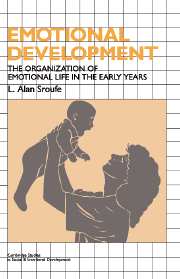Emotional Development
In the past, researchers have treated the development of the emotions and the task of emotional regulation as two separate topics, the former emphasizing "normative" questions and the latter emphasizing "individual" differences. Until now, understanding the first topic has never been seen as relevant for the second. This is the area pioneered by Emotional Development. This book presents the early phases of emotional life from a developmental perspective. It argues that emotional generation hinges on the developing ability to express arousal or "tension" in accordance with one's context. It reveals the common core processes underlying the emergence of specific emotions and the capacity for emotional regulation. The book also explains the timing of emotional emergence, why emotions function as they do, and individual styles of emotional regulation. Close ties between emotional development, cognitive, social and CNS development are discussed, as well.
- Offers a coherent, unified account of the development of the emotions and emotional regulation
- Sroufe is well known and highly respected in the field of developmental psychology
- Well received by the profession when first published in hardback
Reviews & endorsements
"… precisely detailed descriptions … painstaking observational research … well suited for advanced scholars who wish to keep a sharp edge on their expertise. But it is even more useful for the young scholar in order to build a broad, well balanced persepctive …"
Peter LaFreniere, Human Ethology Bulletin
"A masterful account of emotional development during the early years. It is an enormous challenge to provide an integrated picture of our current knowledge concerning the increasingly organized complexity that takes place in this area. Sroufe has done just that. In lucid prose, rich with examples, a coherent story is told from a developmental systems perspective. Using a central concept of regulation, the author also includes key aspects of cognitive, social, and physiological development, as well as particular aspects of attachment. As the reader would expect, the author's extensive experience and insights from longitudinal and experimental work carried out over nearly three decades are included. A strong clinical perspective is also evident; dimensions of individuality, meaning, and adaptation are pervasive."
Robert N. Emde, University of Colorado
"… an important contribution to our understanding of the emotional worlds of our patients … It sets out comprehensively, and with academic rigour, how the experience and expression of emotion is a central strand of individual development."
Tamsin Cottis, New Directions in Psychotherapy and Relational Psychoanalysis
Product details
September 1997Paperback
9780521629928
280 pages
231 × 151 × 18 mm
0.417kg
5 b/w illus.
Available
Table of Contents
- Part I. The Nature of Emotional Development:
- 1. A perspective on development
- 2. Conceptual issues underlying the study of emotion
- 3. Emotion and the organization of development
- Part II. The Unfolding of the Emotions:
- 4. An organizational perspective on the emergence of emotions
- 5. The development of joy: a prototype for the study of emotion
- 6. The development of fear: further illustration of the organizational viewpoint
- 7. The interdependence of affect and cognition
- 8. Meaning, evaluation, and emotion
- Part III. Emotional Development and Individual Adaption:
- 9. The social nature of emotional development
- 10. Attachment: the dyadic regulation of emotion
- 11. The emerging of the autonomous self: caregiver guided self-regulation
- 12. The growth of self-regulation
- 13. Summation.




